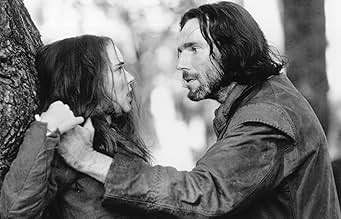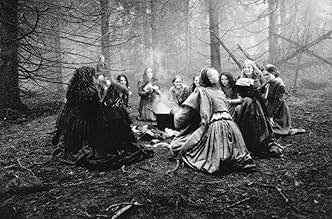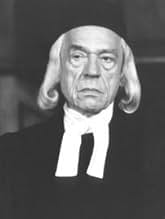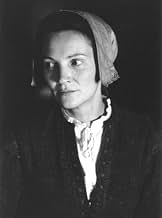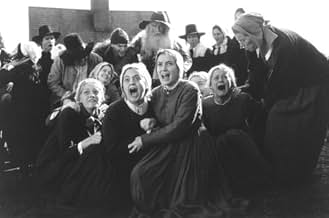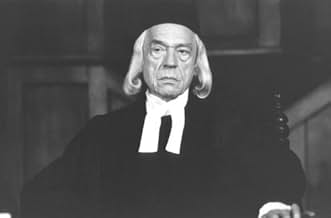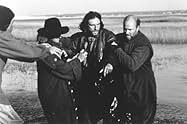A Salem resident attempts to frame her ex-lover's wife for being a witch in the middle of the 1692 witchcraft trials.A Salem resident attempts to frame her ex-lover's wife for being a witch in the middle of the 1692 witchcraft trials.A Salem resident attempts to frame her ex-lover's wife for being a witch in the middle of the 1692 witchcraft trials.
- Nominated for 2 Oscars
- 4 wins & 29 nominations total
Storyline
Did you know
- TriviaSir Daniel Day-Lewis met his wife Rebecca Miller, the daughter of Arthur Miller, while shooting the film.
- GoofsWhen John Proctor and Elizabeth are having their private conversation towards the end of the movie, his teeth look normal. However once they return to judge and Rev. Hale, his teeth look rotted and decayed. When he his hanged (the same day) his teeth are normal again.
- Quotes
John Proctor: Because it is my name! Because I cannot have another in my life! Because I lie and sign myself to lies! Because I am not worth the dust on the feet of them you have hanged! How may I live without my name? I have given you my soul; leave me my name!
- SoundtracksThe Yanvalou Chant
Provided by Shakmah Winddrum
Featured review
Arthur Miller wrote the play on which this movie was based in 1953. 1953 in the United States was the height of the Red Scare, with McCarthy and Nixon among others seeking to hunt down and destroy Communists - often with little or conflicting evidence, and often to the ruin of those accused on such flimsy evidence. Miller couldn't write a play depicting the abuses of the Communist witch-hunt, so he did the next best thing - he wrote a play based on the incident in American history that might be the closest thing to the Communist witch-hunts: the Salem Witch Trials of 1692, in which rumours led to suspicions, and personal jealousies and ambitions led to accusations and people lied about their neighbours and friends in order to deflect attention away from themselves and innocent people were forced to confess to witchcraft because if they denied it (no matter their innocence) they'd hang and the courts became less interested in discovering the truth than in rooting out the evil. It's actually quite a good parallel.
This 1996 movie is based on Miller's play, and the screenplay for it was written by Miller himself. It's a sometimes chaotic movie - quite in keeping with the subject matter (either the official subject matter of the 1690's or the unofficial subject matter of the 1950's) - but in its chaos one picks up the basic point of how easily otherwise good people with normally good intentions can get caught up in evil ways. The devil may well have been on the prowl in Salem in 1692 - not through the accused but rather through their accusers and the system that encouraged and empowered the accusers.
Generally speaking the performances here were pretty solid. Both Daniel Day-Lewis (as John Proctor) and Winona Ryder (as Abigail Williams) carried themselves well and the supporting cast was strong. The portrayal of life in a 17th century Puritan community is a little bit difficult to relate to, and even the Puritan manner of referring to virtually all married women as "Goody" (short for "Goodwife") grates for a while and sometimes creates confusion for the viewer in trying to keep the characters straight, because it's so unusual to modern ears - although, on the other hand, it does provide an air of authenticity to the movie.
One can only be grateful that the Witch Hunt ended fairly quickly (although a good number of people were executed.) The Communist witch hunt lasted unfortunately longer with a greater number of people being scarred for life by the experience (and, indeed, some losing their lives as a result of it.) One would like to think that we've progressed over the years, although the demonization of Moslems since 9/11 - although is hasn't perhaps reached the depths of 1692 or the 1950's - suggests that the possibilities for such excesses are still present with us. (7/10)
This 1996 movie is based on Miller's play, and the screenplay for it was written by Miller himself. It's a sometimes chaotic movie - quite in keeping with the subject matter (either the official subject matter of the 1690's or the unofficial subject matter of the 1950's) - but in its chaos one picks up the basic point of how easily otherwise good people with normally good intentions can get caught up in evil ways. The devil may well have been on the prowl in Salem in 1692 - not through the accused but rather through their accusers and the system that encouraged and empowered the accusers.
Generally speaking the performances here were pretty solid. Both Daniel Day-Lewis (as John Proctor) and Winona Ryder (as Abigail Williams) carried themselves well and the supporting cast was strong. The portrayal of life in a 17th century Puritan community is a little bit difficult to relate to, and even the Puritan manner of referring to virtually all married women as "Goody" (short for "Goodwife") grates for a while and sometimes creates confusion for the viewer in trying to keep the characters straight, because it's so unusual to modern ears - although, on the other hand, it does provide an air of authenticity to the movie.
One can only be grateful that the Witch Hunt ended fairly quickly (although a good number of people were executed.) The Communist witch hunt lasted unfortunately longer with a greater number of people being scarred for life by the experience (and, indeed, some losing their lives as a result of it.) One would like to think that we've progressed over the years, although the demonization of Moslems since 9/11 - although is hasn't perhaps reached the depths of 1692 or the 1950's - suggests that the possibilities for such excesses are still present with us. (7/10)
- How long is The Crucible?Powered by Alexa
Details
Box office
- Budget
- $25,000,000 (estimated)
- Gross US & Canada
- $7,343,114
- Opening weekend US & Canada
- $62,995
- Dec 1, 1996
- Gross worldwide
- $7,343,114
- Runtime2 hours 4 minutes
- Color
- Sound mix
- Aspect ratio
- 1.85 : 1
Contribute to this page
Suggest an edit or add missing content




